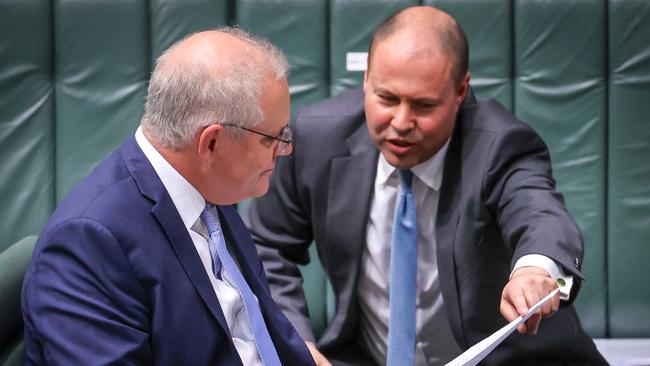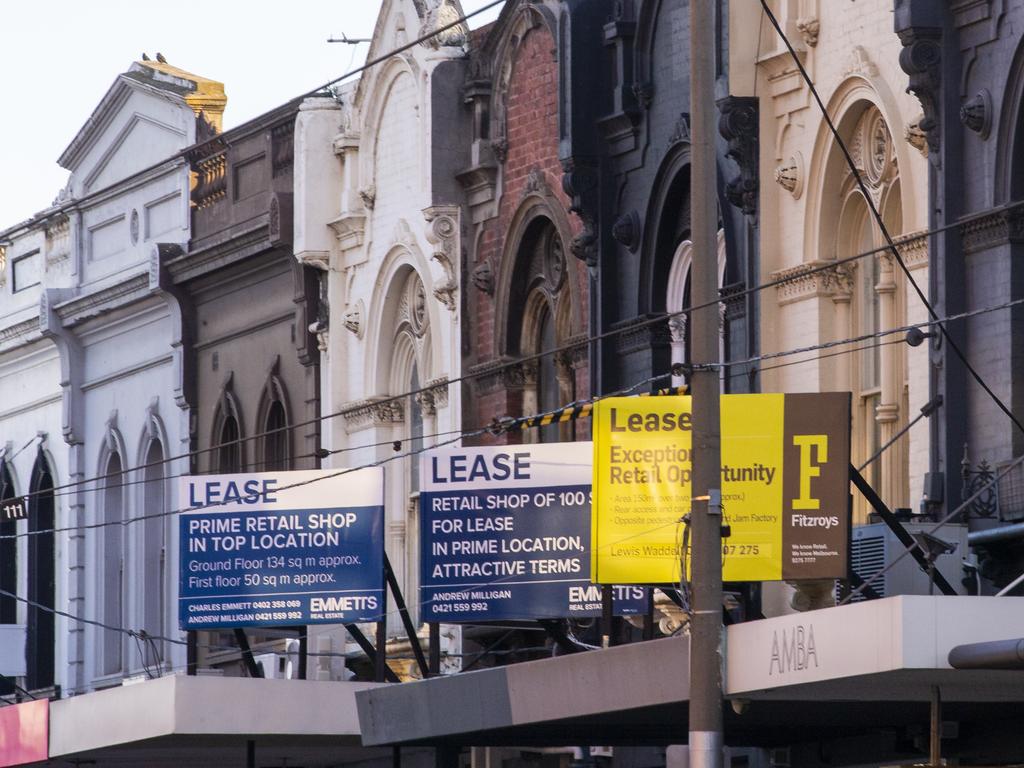Federal budget: How pandemic rewrites political rules

Two of the pillars of conservative thought — small government and balanced budgets — have been smashed by the pandemic. Government is now much larger and more pervasive, and the expansion is funded by massive amounts of borrowed money!
Thanks largely to the second Victorian lockdown, the forward estimate deficits to be revealed on October 6 are likely to be bigger than even the most fervid apostles of Modern Monetary Theory would have thought possible, but cursing Dan Andrews won’t get the federal government very far. Debt is going to blow out.
So to appease its donors and media supporters on the right (the “base”), a right-wing variety of virtue-signalling will be required from the Coalition, and it’s already happening. For a start, the budget seems to have already been given a marketing brand — JobMaker — to set the scene.
The key imperative is to deliver more debt-funded household and business income support than would be comfortable for a Coalition partyroom, to ensure that a credit crisis doesn’t develop next year and that unemployment starts coming down in time for the 2022 election.
Bringing forward tax cuts and infrastructure spending look like being two of the headline acts of the JobMaker budget. But while Treasury will no doubt produce modelling that confirms these things will Make Many Jobs, they will blow out the deficit and debt even further and won’t really do anything in time for May 2022 to offset the impact on consumption and employment of removing the JobKeeper and JobSeeker supplement payments.
They will take too long, and those affected by the removal of income support are not construction workers and they won’t have any income to be taxed less. So income support will have to be extended, along with other non-Coalition spending measures. Thus the need for some right-wing virtue signalling.
Reading the signals
There can’t be spending cuts, including more cuts for the hated ABC, since a lot of people have just departed it very publicly and the 7.45am news bulletin has been axed, so it wouldn’t be a good look.
Industrial relations reform is both dangerous and counter-productive, although maybe penalty rates in hospitality will get another run.
Announcing a government-built gas-fired power station to replace Liddell was definitely virtue-signalling, since there is not much danger of one actually getting built. It’s also further evidence of the drift towards socialism in the year of the pandemic, although it probably just demonstrates the mystical power of anti-climate change for conservatives: even nationalisation is OK if it’s a fossil fuel. A coal-power station would have been better, of course, but even Angus Taylor couldn’t go to the 2020 UN climate change conference in Glasgow in November promising to build one of those. He’d be hooted off the stage (although he still might be — he and the Prime Minister are going with technology as the solution to global warming, which got rolled eyes in Madrid last year. This year they won’t be so polite).
So it looks like they’ll have to wheel out an attack on industry super funds.
A super solution
The legislated increase in compulsory salary deductions to 12 per cent of salary will be unlegislated, and another round of early release withdrawals may also be allowed because it’s free stimulus money for the government and has the added bonus of causing liquidity problems for industry funds.
The clamour for something to be done about industry funds grew louder this month with the sacking of the CEO of Rio Tinto, Jean-Sebastien Jacques, because of pressure from AustralianSuper and HESTA — a humiliation for the corporate classes just three weeks after the board defended him.
These industry funds are getting way too big for their boots, and in fact over the weekend the Minister for Superannuation, Jane Hume, accused them of being “noisy” and “belligerent”.
There’s also talk that the superannuation guarantee will be made voluntary rather than compulsory, to put further pressure on the industry funds, but that seems unlikely at this stage. Maybe later.
They do have to be careful not to simply force industry funds to consolidate, with the larger ones mopping up the less economic smaller ones. That will only make AustralianSuper and the other “noisy, belligerent” funds more powerful than they already are, so conservatives need to be careful what they wish for.
But right or left, virtue-signalling is about emotion and ideology, not rational thought.
Demand destruction
Withdrawing fiscal support too soon would be disastrous — for the government, that is. Unemployment is still going to be very high in May 2022. Nothing can be done about that, but it needs to be going in the right direction.
Last week Deloitte Access Economics, commissioned by the Australian Council of Social Services, said that the planned phasing out of the JobSeeker supplement would cost $31.3bn in GDP over two years and 145,000 jobs because of demand destruction.
If that modelling is even remotely replicated in Treasury, it raises the nightmare scenario for the 2022 election that a credit squeeze spiral develops next year, as defaults rise and banks cut lending, government payment reductions lead to a fall in consumption, leading to job losses and insolvencies, leading to further falls in consumption and so on.
The good news is that the RBA has extended the Term Funding Facility (cheap liquidity) for the banks, which will offset a credit crunch up to a point, but better not to flirt with austerity too early in the first place. That $200bn could disappear very quickly.
So conservative ideological cover will be needed for further extensions to JobKeeper and the JobSeeker supplement, or some other form of cash, to prevent a collapse in consumption, and mass small business insolvencies.
Politics is always a balance between ideology and pragmatism and the virus hasn’t changed that.
Alan Kohler is editor in chief of Eureka Report







There’ll be two interesting things in next month’s delayed federal budget; three if you include what will be done about the lockup. First, the size of deficits, this year and beyond, and second, what will be the ideological offset to the socialism of 2020.